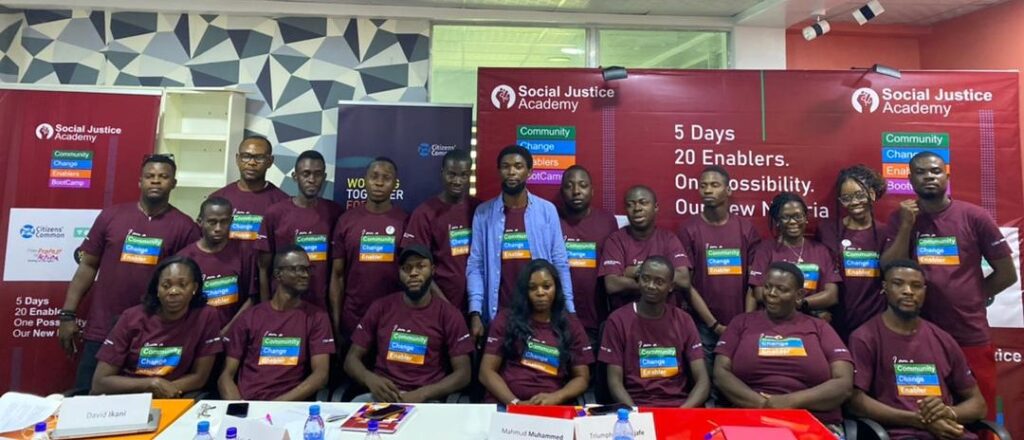
Police Excesses: A Threat to Youth Development in Nigeria
Written By Funke Adeoye
Overview
The Police force is the foremost security institution in most Nations. As such, it is the “go-to” body for citizens to relay matters of security concerns and to receive the required attention. In most Nations, the Police have wide powers under the Law which establishes it. In Nigeria, Section 4 of the Police Act, 2020 imposes broad powers on the Police which include inter alia;
- Prevent and detect crime
- Protect rights and freedoms of citizens in Nigeria
- Maintain public safety, law and order
- Protect the lives and property of all persons in Nigeria
- Facilitate free passage and movement of persons, property and goods along the highways, roads and streets open to the public
- Assist persons in distress such as flood victims or victims of road accidents.
However, when an institution which is saddled with such grave responsibilities begins to thwart the purpose of its establishment and to act as a clog in the wheel of societal development, then, it becomes abysmal. Such is reflective of the current situation of the Nigerian Police Force. The Force is currently renowned for perpetrating all forms of excesses that are clearly antithetical to its formation and commissioning purpose. These excesses include police harassment, police brutality, neglect of duties, acts of bribery and corruption etc. This article briefly x-rays the occurrence of police harassment, the mode and manner these acts occur, the effect of these on youth development and the way forward.
Police Excesses in Nigeria
In this context, excesses refer to the abuse and misuse of power, position and authority. It includes using the office, influence, and positional title for purposes over and above the original intent of the Legislators who established it. It also includes the application of such power or position for personal gains or benefits. Statistics from the 2016 World Internal Security and Police Index (WISPI), ranked the Nigerian Police as the worst in the world and up till now, we see daily reports via the media that show the force committing infractions which infringe on the rights of the citizens she was established to protect and whose properties she is tasked to preserve and secure.
In Nigeria, police excesses take varied forms. In particular, this article focuses on those aspects of police misbehaviour targeted at the Nation’s youth. These occur in the form of police harassment, intimidation and threats, police violence and brutality, extortion and bribery.
Police Harassment and Infringement of Rights of Nigerian Youths
Needless to say that the renowned #Endsars movement of 2020 was sparked by angry youths who were protesting the constant harassment meted on them by men of the Nigerian Police Force. In particular, this harassment was against young men who were profiled as ‘criminals’ by the police simply by the way they are dressed or the gadgets or devices they own or have on them at the time of sighting the police. The idea behind such labelling by the Force men is that young men who look a certain way, drive certain brands of cars, move around with certain types of phones and laptops (e.g, iPhones), and who look ‘fresh’, are automatically branded as ‘yahoo boys’ (i.e, internet fraudsters). As such, they are accosted, searched, have their devices confiscated and in some cases, assaulted and arrested with the expectation that the young men will bail themselves with huge sums of money.
In the course of doing these, the police majorly infringe on the right to dignity guaranteed by section 34 of the Constitution, the right to privacy guaranteed by section 37, and the right to a fair hearing of the young men provided under section 36 of the Constitution.
Effect of Police Harassment on Youth Development in Nigeria
Unfortunately, some of the young men who have been victims of such acts of harassment from the police are Techpreneurs or start-up founders or employees of the booming Tech industry in Nigeria which has contributed significantly to Nigeria’s GDP in the last five years. Such encounters have left these otherwise young men disillusioned and disaffectioned towards the police and the Nigerian business environment.
The spiral effect of these activities by the police is that it has stifled meaningful contributions towards national growth and development from the youth populace.
Furthermore, it has silently bred a culture of intimidation, fear, and duress in the psyche of young otherwise hard-working men who are eager to contribute to societal growth. This has contributed to a large number of brain drains and migration of the youth population to other saner climes. Psychologically, it is disturbing enough to go out every day as a young man not knowing whether one may be harassed by policemen on account of the type of phone device he holds in his hand.
Physically, to escape these marauding policemen, young men now have to dress “formally” even if such outfits do not suit their fashion styles or convenience.
The Way Forward
The Police have a duty to detect crime and apprehend criminals. This duty must not be gagged in any way. However, the discharge of this and other roles should not be used to subtly perpetuate demeaning acts on young people. Rather, the Police should embrace global best policing practices in all of its activities. More importantly, is that the police need a reorientation, especially in their approach towards young people bearing in mind that the youth are the fulcrum of development in any Nation. Furthermore, police reforms must necessarily take into account the welfare of police officers. The offices for police officers must be refurbished to have some semblance of a conducive workplace. The Police Trust Fund must be properly appropriated and applied for the betterment of a lot of police officers across the Nation. There ought to be a feedback mechanism on how the funds of the Trust Fund are expended. Lastly, erring officers must be brought to book promptly. Despite the large number of police high-handedness reported during the Endsars protests, very few named officers have been made to face the consequences of their actions. The failure to fully deal with erring officers as the law dictates further dampens the spirit of well-meaning Nigerians and where this constitutes a large portion of young people, then, the Nation is set on the stage of developmental decline.
This article is an Excerpt from the report ” A Nigeria For The Many And Not The Few”
About the Author
Funke Adeoye is a Lawyer and Social Entrepreneur. She leads Hope Behind Bars Africa, a social impact start-up working to close the justice gap in Nigeria through legal aid, policy advocacy and technology. A graduate of law from the University of Benin, Funke is a Fellow of Cornell University Makwanyane Institute for Capital Defenders. She has an Executive Certificate in Nonprofit Leadership and Management from Lagos Business School. In 2020, she was listed by Attic London as one of the lawyers changing the world for the better.
Instagram & Twitter: @thefunkeadeoye: Linkedin: Oluwafunke Adeoye.







Responses